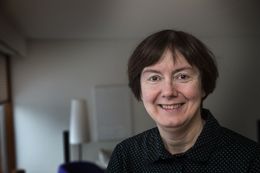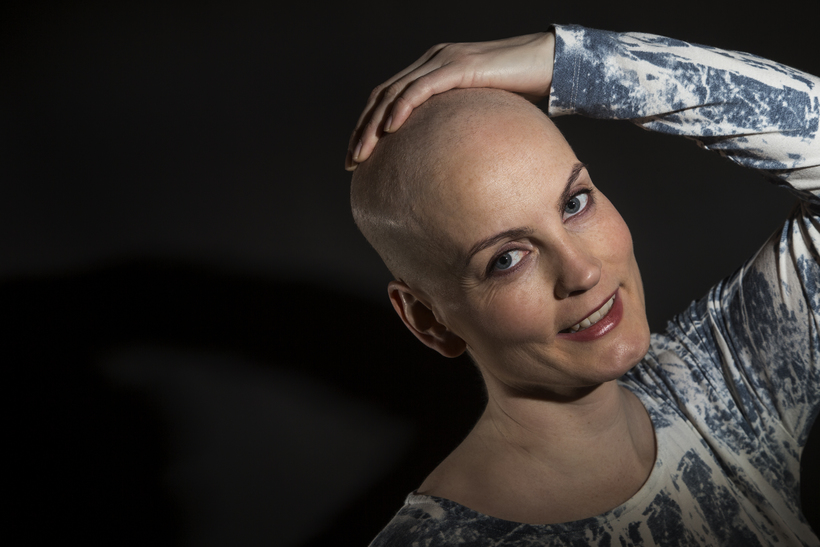Facing cancer during pregnancy
Ingveldur Geirsdóttir lost her hair during chemotherapy. " It could also just be some sort of punk fashion statement," she says laughingly. Mbl.is/( KRISTINN INGVARSSON
One to two pregnant women are diagnosed with cancer each year in Iceland. According to Hulda Hjartardóttir, obstetrician for women with high risk pregnancies at the National University Hospital there are a surprising number of things that can be done for these women without it affecting the pregnancy. Journalist Ingveldur Geirsdóttir who underwent chemotherapy whilst expecting her second child is interviewed in the Sunday edition of Morgunblaðið this weekend.
"If a woman is diagnosed with cancer in pregnancy there are two choices to make: Treating the cancer like with every other cancer patient, or waiting until the child is born to commence treatment. In Geirsdóttir's case, waiting was not an option as she had been diagnosed with a particularly aggressive form of breast cancer, " Hjartardóttir explains.
Didn't think it was cancer
In the interview with Morgunblaðið, Geirsdóttir explains that she found an unusual swelling in her left breast at the beginning of October. She had not been particularly worried as she thought the swelling was a pregnancy symptom. "A milk duct had become infected when I was breastfeeding my son seven years ago in the same breast and I thought that this was related to that," she says.

One to two pregnant women are diagnosed with cancer each year in Iceland according to obstetrician Hulda Hjartardóttir. Photo: Mbl.is/KRISTINN INGVARSSON
Asked whether she suspected cancer she says no. "The swelling was red and hot and I didn't think it was cancer." Two days after her tests she received a phonecall and was told that she had been diagnosed with a malignant tumour. After further tests, doctors decided that she was to undergo masectomy and her whole breast was removed. "The life expectancy for women who are diagnosed with this particular cancer is lower than for women with more common types of breast cancer and it's more likely that the cancer will spread to other parts of the body," she explains. The tumour in her breast had grown to 4,6 centimetres.
Losing a breast is no big deal
Chemotherapy went well. "I was tired for the first few days but that's all. It's gone remarkably well. I've been able to do all the things I did before. I go out for walks and I go swimming. Exercise is important to get the blood moving. I'm on sick leave at work but have been taking on a couple of projects. I've also made sure that I go out to see my friends. Staying home, alone is not something that I like doing. Kiddi (her partner) says that I'm a hopeless patient and that I don't need to be taken care of."
She did not receive constructive surgery when she underwent her masectomy because of the pregnancy and therefore she only has one breast for the moment. "It's no big deal. It's not like I lost an arm or a leg. I don't have any hangups about it. I've always been fairly hapoy with my body and I still find it beautiful."
Not afraid of death
"No, I'm not afraid of death," she says. "Most of those diagnosed with cancer live, others die. In my case, doctors are optimistic and think that they've been successful in removing the cancer and that it hasn't spread further. Time will tell. I guess I've always had a certain serenity. My values in life were formed when I was growing up on a farm. As a little girl I saw how life began, when the bulls mounted the cows and the rams mounted the ewes. I also got to know death. I delivered dead lambs and calves and I often buried them. My siblings and I often made wooden crosses for their graves, placed flowers on them and sang hymns. One cannot control these things, they are a part of life. I've always had my two feet firmly on the ground and I don't need people feel sorry for me. I don't feel sorry for myself and I don't want others to. "
An ideal patient
Obstetrician Hulda Hjartardóttir says that Geirsdóttir's pregnancy has gone remarkably well. The baby is doing well and the outlook is good although obviously she has to be closely monitored both before and after birth. "She has been a very willing listener and taking care of her has been without any problems. I hope that everything will go well for her. "
Related article:








